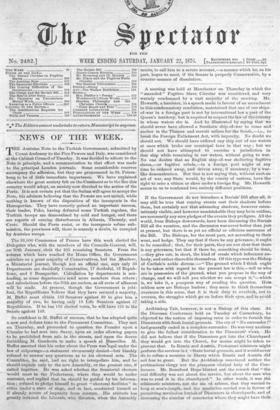A meeting was held at Manchester on Thursday in which
the " amended " Fugitive Slave Circular was considered, and very warmly condemned by a vast majority of the meeting. Mr. Howarth, a barrister, in a speech made in favour of an amendment to this condemnatory resolution, maintained that one of our ships- of-war in a foreign port is not by international law a part of the Queen's territory; but is required to respect the law of the Country in whose waters she is. Aud he illustrated by saying that we should never have allowed a Southern ship-of-war to come and anchor in the Thames and recruit sailors for the South, —i.e., to break the Foreign Enlistment Act, with impunity. No doubt we should not. We should have ordered any ship out of our waters at once which broke our municipal laws in that way ; but we should not have attempted to exercise a jurisdiction in that ship while remaining in our waters, without going to war. No one doubts that an English ship-of-war sheltering fugitive slaves,—or fugitive rebels,—in a foreign port might at any time be ordered away, and driven away, if necessary, by a war- like demonstration. But that is not saying that, without such an act of war, any State would, by the comity of nations, have the right to seize a citizen or slave under a foreign flag. Mr. Howarth seems to us to confound two entirely different positions.


































